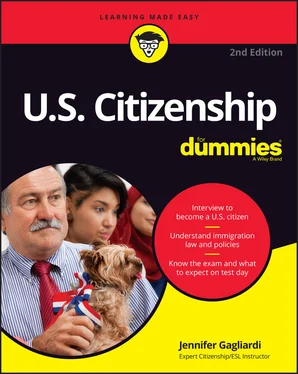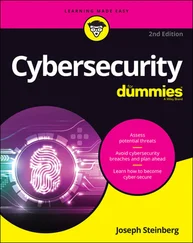Jennifer Gagliardi - U.S. Citizenship For Dummies
Здесь есть возможность читать онлайн «Jennifer Gagliardi - U.S. Citizenship For Dummies» — ознакомительный отрывок электронной книги совершенно бесплатно, а после прочтения отрывка купить полную версию. В некоторых случаях можно слушать аудио, скачать через торрент в формате fb2 и присутствует краткое содержание. Жанр: unrecognised, на английском языке. Описание произведения, (предисловие) а так же отзывы посетителей доступны на портале библиотеки ЛибКат.
- Название:U.S. Citizenship For Dummies
- Автор:
- Жанр:
- Год:неизвестен
- ISBN:нет данных
- Рейтинг книги:3 / 5. Голосов: 1
-
Избранное:Добавить в избранное
- Отзывы:
-
Ваша оценка:
- 60
- 1
- 2
- 3
- 4
- 5
U.S. Citizenship For Dummies: краткое содержание, описание и аннотация
Предлагаем к чтению аннотацию, описание, краткое содержание или предисловие (зависит от того, что написал сам автор книги «U.S. Citizenship For Dummies»). Если вы не нашли необходимую информацию о книге — напишите в комментариях, мы постараемся отыскать её.
U.S. Citizenship For Dummies
U.S. Citizenship For Dummies
U.S. Citizenship For Dummies — читать онлайн ознакомительный отрывок
Ниже представлен текст книги, разбитый по страницам. Система сохранения места последней прочитанной страницы, позволяет с удобством читать онлайн бесплатно книгу «U.S. Citizenship For Dummies», без необходимости каждый раз заново искать на чём Вы остановились. Поставьте закладку, и сможете в любой момент перейти на страницу, на которой закончили чтение.
Интервал:
Закладка:
The ability to read, write, and speak basic English.
A basic knowledge and understanding of U.S. history and government.
Good moral character. Applicants for naturalization must be “of good moral character,” meaning that the USCIS will make a determination based on current laws. Conviction for certain crimes will cause you to lose your eligibility for citizenship. If you have ever been convicted of murder or convicted of an aggravated felony (committed on or after November 29, 1990), you may never become a citizen of the United States. Other lesser crimes may delay your immigration or citizenship goals because they prevent you from applying until a specified amount of time has passed since you committed the crime. In 2014, USCIS added additional questions about violent activities and war crimes as per U.S. national security laws. These additional questions doubled the size of the N-400 Application for Naturalization from 10 to 20 pages’ worth of questions that will be asked during your naturalization interview! In determining good moral character, however, the USCIS can consider conduct that would have been a crime even if you were never arrested, charged, or convicted. (You can find more on good moral character in Chapter 3.)
Attachment to the principles of the U.S. Constitution and a favorable disposition toward the United States. This means that you must be willing to take the Oath of Allegiance to the United States of America, giving up any prior allegiances to other countries.
SERVING YOUR WAY TO CITIZENSHIP
If you served honorably in the U.S. armed forces for at least one year at any time, you may be eligible to apply for naturalization. Currently, you must be a permanent resident at the time of your interview. In times of war or other declared hostilities, members of the U.S. armed forces may naturalize without even being lawful permanent residents. Such periods are designated by law or by Executive Order of the president and have included World War I, World War II, the Korean War, the Vietnam police action, and the Gulf War. Most recently, the War on Terror was added, allowing all active-duty military personnel honorably serving on or after September 11, 2001, until a date to be determined, to be naturalized without regard to prior permanent resident status. For further information about eligibility based on military service, see www.uscis.gov/military/naturalization-through-military-service .
Don’t worry if this sounds like a lot. The purpose of this book is to help get you ready to successfully complete your immigration goals all the way to becoming a U.S. citizen. We go into greater detail on all these requirements later in the book.
Making Sense of the Immigration Process
If you bought this book, you’re obviously interested in being more than just a temporary visitor to the United States. You want to be a U.S. citizen. But first you must become a lawful permanent resident (with one exception — see the “Serving your way to citizenship” sidebar, earlier in this chapter).
Doing the paperwork
The type of application you file will depend on your path to immigration — in most cases, through family or through employment. (You can find more details on specific forms and paperwork in Chapter 4.)
After the USCIS approves your sponsor’s immigrant visa petition, the Department of State must determine if an immigrant visa number is immediately available to you or if you will be on a waiting list. When an immigrant visa becomes available to you, you can process your immigrant visa through a U.S. consulate.
 If you’re already in the United States, you may only apply to change your status to that of a lawful permanent resident after a visa number becomes available for you.
If you’re already in the United States, you may only apply to change your status to that of a lawful permanent resident after a visa number becomes available for you.
Proving your identity
In order to gain your Permanent Resident Card, if you’re adjusting your status while in the United States, or to become a naturalized citizen, you’re going to have to prove your identity. Be prepared to be fingerprinted and provide the USCIS with at least two photographs, in addition to documents and paperwork that must be included with your application (you can find more information on this in Chapter 4).
IT’S NOT EASY BEING GREEN
A Permanent Resident Card is evidence of your status as a lawful permanent resident. Although in popular lingo it’s called a “green card,” the Permanent Resident Card is officially known as USCIS Form I-551. At one time in its history, the Permanent Resident Card was known as the Alien Registration Receipt Card. The cards used to actually be green, too. Even though today’s cards are no longer green, the name has worked its way into the slang, or popular language, and people still refer to Alien Registration Receipt Cards or Permanent Resident Cards as green cards.
Even if you have a Permanent Resident Card, you’ll have to be fingerprinted and photographed when applying to become a naturalized citizen. After you’ve filed an application with the USCIS, you will receive a fingerprinting appointment letter, usually advising you to go to a local application support center or police station. The USCIS will do a criminal background check, cross-referencing your fingerprints with the Federal Bureau of Investigation (FBI). In some cases, the quality of the fingerprints is not sufficient for the FBI to read. If this happens, the USCIS will notify you of another fingerprinting appointment. Don’t worry — you’ll only have to pay a fingerprinting fee ($85 as of this writing) once.
 If the FBI rejects your fingerprints twice, you’ll most likely be asked to provide police clearances for every place you’ve lived since you were 16 years old. Contact the local police departments in those cities or towns to obtain the clearances. If you’re processing through an overseas consulate, as opposed to adjusting your status while in the United States, you’ll need to provide police clearances for every place you have lived (for your country of nationality if you lived there six months or more; for all other countries, if you lived there for at least one year).
If the FBI rejects your fingerprints twice, you’ll most likely be asked to provide police clearances for every place you’ve lived since you were 16 years old. Contact the local police departments in those cities or towns to obtain the clearances. If you’re processing through an overseas consulate, as opposed to adjusting your status while in the United States, you’ll need to provide police clearances for every place you have lived (for your country of nationality if you lived there six months or more; for all other countries, if you lived there for at least one year).
 In some cases, especially if you live far away from the nearest fingerprinting station, a mobile fingerprinting van will travel to perform the process.
In some cases, especially if you live far away from the nearest fingerprinting station, a mobile fingerprinting van will travel to perform the process.
Being Interviewed by the USCIS
Presuming you plan on following the immigration path all the way to the final step of naturalization, you can plan on interviewing with the USCIS at least twice: once to qualify for your permanent resident status or green card, and again when you become a naturalized U.S. citizen (unless your visa processing took place at an overseas consulate, in which case you’ll only interview with USCIS once — for naturalization).
The interviews fill many potential immigrants and citizens with terror. “How will I ever remember everything?” they worry. Relax. Passing the USCIS interview is easier (you are The Expert of your own life) and more difficult (uncommon vocabulary related to violent activities and war crimes) than you think. For some people, the biggest challenge is learning how to speak a new, crazy language, English. Don’t worry; study! In fact, you probably already have most, if not all, of the skills and information you need. And if you don’t, this book has you covered.
Читать дальшеИнтервал:
Закладка:
Похожие книги на «U.S. Citizenship For Dummies»
Представляем Вашему вниманию похожие книги на «U.S. Citizenship For Dummies» списком для выбора. Мы отобрали схожую по названию и смыслу литературу в надежде предоставить читателям больше вариантов отыскать новые, интересные, ещё непрочитанные произведения.
Обсуждение, отзывы о книге «U.S. Citizenship For Dummies» и просто собственные мнения читателей. Оставьте ваши комментарии, напишите, что Вы думаете о произведении, его смысле или главных героях. Укажите что конкретно понравилось, а что нет, и почему Вы так считаете.












